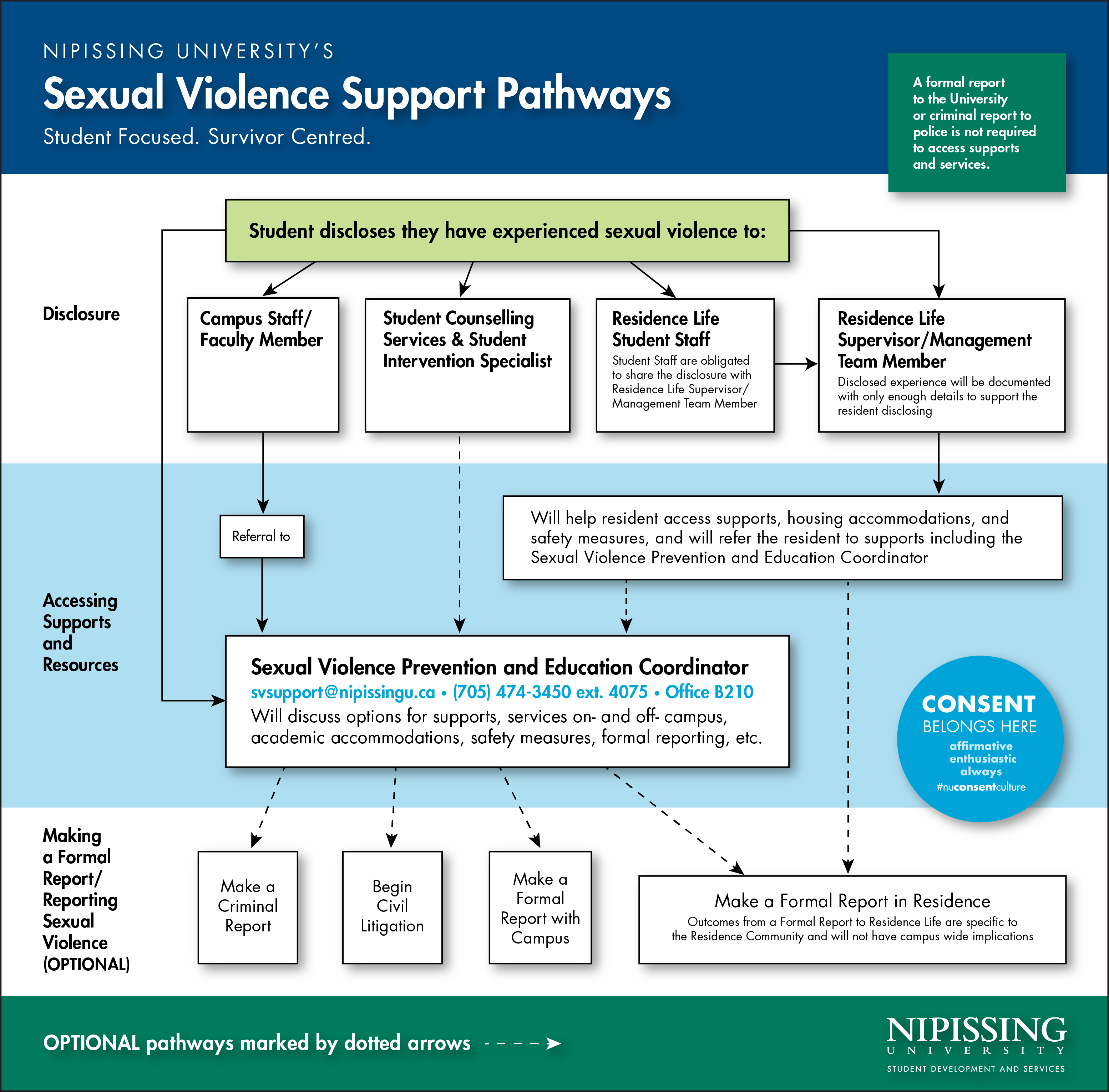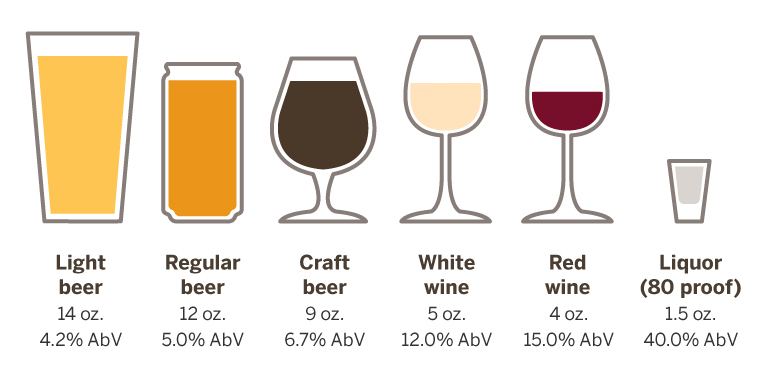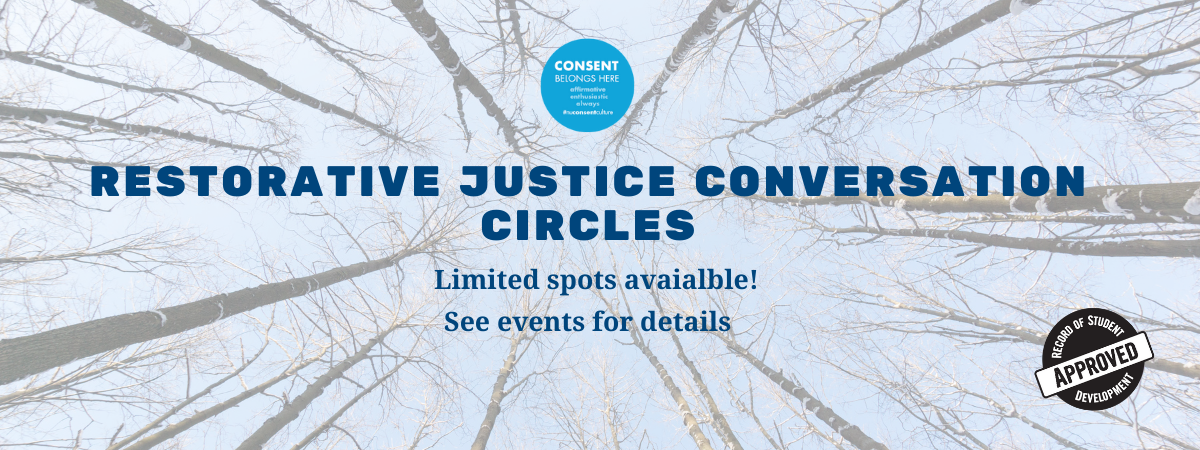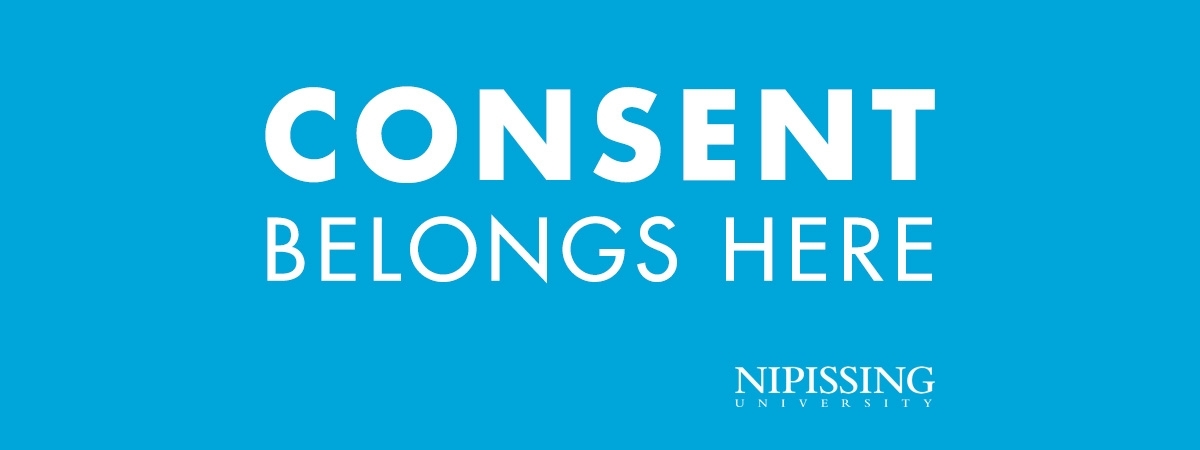Sexual Violence Prevention and Education works to build awareness about sexual violence and gender-based violence on campus and make accessible the supports and services for those who are affected. The Sexual Violence Prevention and Education Coordinator provides support to survivors, students, staff and faculty.
For more information on Sexual Violence Prevention and Education, explore the links below:
Sexual Violence Prevention and Education Events
- About
- Getting Support
- Giving Help & Support
- Workshops & Events
- Topics & Resources
- REES
- Training & Education
Our services are available to all members of the Lakers community, including undergraduate, graduate, and continuing education students, staff, and faculty. Sexual Violence Prevention and Education works to build awareness about sexual violence and gender-based violence on campus and make accessible the supports and services for those affected.
Response and Support
If you have experienced sexual violence, please know that the Sexual Violence Prevention and Education Coordinator is available to listen, support, and help you navigate the next steps in non-emergency situations. If you feel you are in danger, contact 911.
Prevention, Education and Training
Consent Belongs Here is Nipissing University’s campaign to end sexual violence through education, prevention and outreach. Consent Belongs Here will be organizing events and initiatives on campus focused on sexual violence prevention and education throughout the year.
Community and Referrals
Sexual Violence Prevention and Education provides information and guidance for any community member on the policy, procedures, programs, and referral to campus and community services and resources.
If you are in immediate danger or a life-threatening situation, CALL 911

If you have experienced sexual violence or are supporting someone who has experienced sexual violence, the Sexual Violence Prevention and Education Coordinator is available to listen, support, and help you navigate the next steps in non-emergency situations.
If you are in immediate danger, contact 911.
Sexual Violence Prevention & Education Coordinator
Office: Student Development & Services, B210
Phone: 705-474-3450 ext. 4075
Email: svsupport@nipissingu.ca
Our services are available to all members of the Lakers community, including undergraduate, graduate, and continuing education students, staff, and faculty.
What you can expect:
When connecting with the Sexual Violence Prevention and Education Coordinator you can expect non-judgemental support to your disclosure and help to navigate the support options available, such as:
- consider safety measures that may be necessary;
- refers for medical services, as needed;
- actively and empathically listen to their needs and concerns without judgement;
- share reporting options available;
- clarify commitments to confidentiality and its limits;
- explain the difference between disclosure and reporting;
- make a referral to the police, if the individual chooses that option
- assist with navigating any relevant University systems and procedures;
- facilitate academic and/or residence accommodations;
- provide information about and referral to campus and community services; and
- liaise with relevant partners to ensure coordinated response and support.
Mental Health & Wellbeing
Mental Health & Wellbeing works to support all students in achieving positive mental and emotional wellness.
Nipissing University Mental Health & Wellbeing
Office: B210
Phone: 705-474-3450 ext. 4507
E-mail: mhwellbeing@nipissingu.ca
Website: www.nipissingu.ca/mhwellbeing
Amelia Rising – Sexual Assault Centre of Nipissing
Amelia Rising Sexual Violence Support Centre provides free, completely confidential support for people 12 years of age and older who have experienced sexual or gender-based violence.
Amelia Rising – Sexual Assault Centre of Nipissing
101 Worthington St E., Suite 11 (lower level)
North Bay, Ontario, Canada, P1B 1G5
Phone: 705-840-2403
Fax: 705-840-5050
Website: http://www.ameliarising.ca/
North Bay Regional Health Centre – Sexual Assault Treatment Centre
The Sexual Assault/Domestic Violence Program and Treatment Centre at NBRHC is an individualized service available to survivors of sexual assault, intimate partner violence. The program provides emergency health care and psychosocial support, and follow-up care by specially trained nurses.
North Bay Regional Health Centre – Sexual Assault Treatment Centre
50 College Drive
P.O. Box 2500
North Bay, ON
P1B 5A4
Phone: 705-474-8600 ext. 4478
Website: http://www.nbrhc.on.ca/programs-services/medical-services-2/sexual-assault-treatment-centre/
Helplines and Online Support
Good2Talk (Postsecondary Student Helpline): 1-866-925-5454
Victim Support Line: 1-888-579-2888
Mental Health Helpline (Health Services Information): 1-866-531-2600
Support Services for Male Survivors of Sexual Abuse: 1-866-887-0015
Assaulted Women’s Helpline: 1-866-863-0511
Talk4Healing (Aboriginal Women’s Helpline): 1-855-554-HEAL (4325)
Police Services
You may choose to report the sexual violence to the police. You may choose to do this whether or not you make a complaint with the University against the accused or not. Making a police report does not stop you from also making a complaint at the University against the accused.
The Sexual Violence Prevention and Education Coordinator is available to chat with you if you would like more information about either of these options or the next steps.
- North Bay Police Service: 705-472-1234
- 22 Wing Military Police: 705-494-2188
- Anishinabek Police Service: 705-472-0270
- West Nipissing Police Service: 705-753-1234
- Ontario Provincial Police (OPP): 1-888-310-1122
Disclaimer
Please note that all external links and resources posted on the Consent Belongs Here website are not meant to replace face-to-face consultation with or diagnoses by qualified professionals, nor are they meant to be "online counselling." The listing of external sites does not imply that Nipissing University or its staff endorse all of the information located there. We cannot guarantee that all information on each site is accurate or complete. The resources and guidelines offered on this site are suggestions only, and do not substitute for consultation with a qualified Mental Health or Medical Professional.
By using these external links, you must agree to not hold the websites themselves, their staff or partners, or Nipissing University staff liable, or make any claims of damages of any kind, including claims of damages based on action taken by you related to the information contained on the respective websites.
Your use of these websites constitutes your agreement to the above terms.
Sexual violence is a traumatic experience. While every individual will react differently, the experience can have significant lasting effects and interrupt many aspects of a survivor's life. A supportive and non-judgemental initial response to disclosure can significantly impact the survivor's ability to seek further support.
If there is an imminent risk of harm:
In an emergency on campus (i.e., imminent threat of sexual violence and of harm to a person or sexual violence actually occurring) a call can be made 24 hours a day, 7 days a week and 365 days a year in the following ways:
- Call 911
- Call Campus Security 705-498-7244
- Emergency phones, located inside the Education Centre near the elevators of the H and A wings. These phones are connected directly to Campus Security. All payphones have free access to 911.
- Emergency phones, located outside the Education Centre and Residence buildings. The blue light can identify these phones and link a caller to an emergency answering service attendant. Simultaneously a call from these phones notifies Campus Security of the call and caller's location.
- In-person: Campus Security office, Education Centre B203
- When a person discloses an incident of sexual violence to Campus Security, Campus Security will inform Student Development and Services that an incident has occurred.
Sexual Violence Prevention & Education Coordinator
The Sexual Violence Prevention and Education Coordinator is available to all members of the University community who may seek support or information related to sexual or gender-based violence. Additionally, the Sexual Violence Prevention and Education Coordinator is available to debrief with and provide support to those who have received a disclosure.
Office: Student Development & Services - B210
Email: svsupport@nipissingu.ca
Phone: 705-474-3450 ext. 4075
Consent Belongs Here is Nipissing University’s campaign to end sexual violence through education, prevention and outreach. The hashtag #nuconsentculture is included as a symbol to start a campus-wide conversation around preventing sexual violence. Consent Belongs: Here, events and initiatives on campus will be organized focused on sexual violence prevention and education throughout the year.
Indicate your interest in participating in upcoming training. All sessions require a minimum of 5 participants.
2024-2025 Training Interest Form
Are you looking for something a little different or personalized training? Email consentbelongshere@nipissingu.ca to let us know what you’d like.
Masculinity Mini Series
The Masculinity Mini-Series explores the evolving concept of masculinity, addressing the challenges, stereotypes, and opportunities for growth that men face today. This series welcomes all students (regardless of gender) to engage in valuable discussions to foster healthier relationships, emotional well-being, and inclusive communities.
Session One: Defining masculinity
🗓️ Thursday, January 16th from 12:00 - 2:00 PM
Session Two: Toxic masculinity
🗓️ Thursday, January 30th from 12:00 - 2:00 PM
Session Three: Moving forward, redefining masculinity and manhood
🗓️ Thursday, February 6th from 12:00 - 2:00 PM
**Why Participate?**
- Gain insights into the evolving definition of masculinity and how it impacts individuals and society
- Engage in discussions that challenge traditional stereotypes and promote a healthier understanding of gender roles.
- Learn skills to foster healthier relationships with peers, family, and within the community.
- Contribute to creating a more inclusive and supportive environment for all students, regardless of gender identity.
- RSD Approved!
Ready to join us?
Complete this form to express your interest in participating.
Restorative Justice Conversation Circles
Are you passionate about addressing gender-based violence in our community? Do you want to learn about restorative justice practices? We invite you to be part of an important initiative!
What Are the Restorative Justice Conversation Circles?
These circles are community discussions aimed at exploring gender-based violence. Together, we will build relationships, raise awareness, and discuss how we can prevent and respond to these issues within our campus community.
Circle Sessions: Attendance at all sessions is required.
Free Lunch will be provided at 12:30 PM before each session!
Session One: What is happening?
🗓️ Friday, January 17th from 1-3 PM
Session Two: Who is affected and how?
🗓️ Friday, January 24th from 1-3 PM
Session Three: What is needed to make things right?
🗓️ Friday, January 31st from 1-3 PM
**Why Participate?**
- Engage in meaningful conversations about gender-based violence
- Learn about restorative justice and its impact
- Build community and foster relationships
- Contribute to positive change in our environment
- RSD Approved!
Ready to join us?
Complete this form to express your interest in participating.
Sexual Violence Prevention & Response Certificates
Are you interested in learning how to build safer spaces for individuals impacted by gendered and sexual violence? The Sexual Violence Prevention & Education Outreach team offers a series of virtual and in-person workshops that focus on building our awareness and skills to respond to disclosures and build solidarity for survivors.
Students who complete each of the following workshops will be eligible to receive a Sexual Violence Prevention Certificate:
- Consent+
- Gender 101
- Intro to Allyship
Students who complete the above workshops in addition to the following workshops will be eligible to receive the Advanced Sexual Violence Prevention & Response Certificate:
- BITB (Bringing in the Bystander)
- Responding to Disclosures: Sexual Violence Response Training for Students
Request your certificate here
Workshop Descriptions
All Consent Belongs Here workshops are Record of Student Development (RSD) approved!
Consent+*
Did you know, less than half of Canadians know what sexual consent means?
In this workshop, we will explore the concept of sexual consent and its significance in the lives of post-secondary students. We'll delve into how power imbalances can affect one's ability to give or receive consent and examine the impact of unwanted sexual behaviour on individuals. Lastly, we'll brainstorm ways to build a consent culture in our personal lives and communities.
Gender 101*
The Gender 101 workshop introduces participants to concepts about gender roles, identity and expression. Workshop facilitators will connect participants' understanding of gender to gender-based violence and harassment issues in our communities. Students will also gain knowledge about resources on campus and in the community.
Bringing in the Bystander*
The Bringing in the Bystander workshop focuses on building awareness, responsibility, and action towards preventing interpersonal violence. This workshop prepares participants to recognize the continuum of sexual violence and with strategies for safe and appropriate bystander interventions. Bringing in the Bystander will include discussions of sexual violence, rape culture, and for individuals to reflect on their own experience and behaviour as bystanders. This workshop may evoke strong emotions in some participants. If you would like more information about Bringing in the Bystander, please email svsupport@nipissingu.ca.
Intro to Allyship*
The Intro to Allyship workshop examines the role of intersecting forms of privilege and oppression, discusses how they contribute to sexual violence at its roots, and engages participants in productive dialogue focused on fostering a greater understanding of the many aspects of critical allyship and its practice.
Sexual Violence Response Training - Students*
This workshop provides participants with interactive and practice-based training on how to respond to a disclosure of sexual violence. This workshop touches on the link between systemic oppression and sexual violence that can impact and create barriers for those impacted by sexual violence. Participants will gain supportive language, resources, and intervention techniques when acting as a prosocial bystander or receiving a disclosure. By the end, participants are equipped with the knowledge, resources, and skills to support survivors when disclosing sexual violence.
RSD Approved
Below are links to websites and resources. Please note, we do not own/maintain the information on these external links. These resources are available in print format from the Sexual Violence Prevention & Education Coordinator in office B210.
Looking for more information? Contact the Sexual Violence Prevention & Education Coordinator:
Office: Student Development & Services - B210
Phone: 705-474-3450 ext. 4075
Email: svsupport@nipissingu.ca
Healthy Relationships
Sex Positive Resources
Human Rights & Consent Law
Sexual Violence
Consent
Sex, Gender and Sexual Orientation
Sex, Gender and Sexual Orientation
Safer Partying
Harm Reduction/Safer Partying Tips
Below is information on have a safer and fun night when consuming alcohol
- Stick with a group and watch out for each other. Plan to arrive together and leave together. If you decide to leave early, let your friends know that you’re leaving and when you arrive home safely.
- Keep your phone charged. Stay in contact with your group, use it to ger home, and in case of an emergency.
- Plan a safe way home. Have a sober friend available to drive, or plan your trip home with a taxi, Uride, or bus.
- Know what you’re drinking. Don’t recognize an ingredient? Use your phone to look it up. Consider avoiding large-batch drinks like punches that may have a deceptively high alcohol content and may have other ingredients added. If you choose to drink from a communal mix, let a friend know, take a slowly and listen to your body.
- Trust your instincts. If you feel unsafe, uncomfortable, or worried for any reason, don’t ignore these feelings. Go with your gut. Get somewhere safe and find someone you trust, or call Campus Security or the Police.
- Don’t leave a drink unattended. That includes when you use the bathroom, go dancing, or leave to make a phone call. Either take the drink with you, have a trusted friend hold it or throw it out. Avoid using the same cup to refill your drink.
- Be aware. Pay attention to your drink and what is going on around you.
- Consume with consent. Make sure everyone consents to each round and let everyone order and pick up their own drink.
- Check-in with yourself. You might have heard the expression, “know your limits.” Whether you drink regularly or not, check in with yourself periodically to register how you feel. If you think you have had too much, ask a staff member to help you get water or get home safely.
- Be aware of sudden changes in the way your body feels. You might have heard the expression, “know your limits.” Whether you drink regularly or not, check in with yourself periodically to register how you feel. If you think you have had too much, ask a staff member to help you get water or get home safely.
- Get help. If something doesn’t look right, step in. Don’t be afraid to let a friend know if you are uncomfortable or worried about their safety.
- Have a snack. Balance out alcohol consumption with drinking water and eating between drinks.
- If you are planning on consuming a lot, ensure you are with a friend in a safe place, and stick to one substance at a time.
Safer Drinking
Canada's Low-Risk Alcohol Drinking Guidelines can help you make informed decisions about drinking.
- Drink slowly. Aim for a maximum of 2 standard drinks in any 3 hours.
- For every drink of alcohol, have one non-alcoholic drink.
- Consider your age, body weight and health when setting your limits.
A standard drink is a measure of how much pure alcohol you are drinking. It varies based on the concentration of alcohol in a beverage.
In Canada, a standard drink is 17.05 millilitres or 13.45 grams of pure alcohol. This is the equivalent of:
- a bottle of beer (12 oz., 341 ml, 5% alcohol)
- a bottle of cider (12 oz., 341 ml, 5% alcohol)
- a glass of wine (5 oz., 142 ml, 12% alcohol)
- a shot glass of spirits (1.5 oz., 43 ml, 40% alcohol)

Image source: https://alcohol.iupui.edu/calculators/alcohol-serving-size.html
Drink Spiking
Any substance that alters ones level of consciousness and / or physical ability to resist or fight back can be used to commit Drug-Facilitated Sexual Assault. Causing someone to ingest something without their awareness is called ‘drink-spiking’, ‘spiking,’ or non-consensual dosing. Alcohol is the most common substance used to facilitate DFSA.
DFSA occurs when alcohol or other substances are used to intentionally sedate or incapacitate a person in order to perpetrate sexual assault. DFSA also makes a person more vulnerable to human trafficking, robbery, abduction and injury.
Most often, the assumption of how DFSA occurs is when a perpetrator puts a drug into an unsuspecting victim’s drink. This is considered a ‘proactive’ DFSA.
A ‘proactive’ DFSA also includes supplying someone with large quantities of alcohol with the intent to incapacitate them.
An ‘opportunistic’ DFSA occurs when someone specifically targets an already intoxicated person.
Redflags
Redflags to watch out for when it comes to drink-spiking when someone is:
- Making 'jokes' or comments about getting people drunk in order to have sex with them.
- Pressuring others to drink faster, larger quantities, or stronger drinks.
- Targeting the most visibly intoxicated person in the space.
- Making or ordering drinks stronger than asked for.
- Trying to get an incapacitated person alone / away from friends, or outside of the space.
- Purchasing drinks for others with a sense of entitlement to attention or physicality in return.
- Pressuring people to do drugs.
- Flirting with people who are in need of care or support due to over intoxication.
(source: goodnightoutvancouver.com)
Signs and symptoms
Signs and symptoms that can accompany non-consensual dosing:
- Slurred Speech
- Dizziness
- Drowsiness
- Headache
- Passing out
- Vomiting
- Alert & aware but unable to move
- Someone saying something like "I shouldn't be this drunk" or "I've only had one drink."
- Missing parts or all of the evening
- Hangover doesn’t match amount drank
- Indicators of sexual assault
- conciseness (blacking out)
- Loss of memory
(source: goodnightoutvancouver.com)
If you have been a victim of drink spiking or non-consensual dosing, it is not your fault. Please see our Getting Help tab.

In partnership with the Nipissing University Student Union (NUSU), Nipissing University has joined with REES (Respect, Educate, Empower Survivors) to provide online reporting for sexual violence on campus. REES allows campus community members to Create a Record of the incident and choose from multiple reporting options: Anonymous Report, Connect to My Campus, or Repeat Perpetrator Identification (RPI). REES provides information about campus and community-based resources such as sexual assault centres, healthcare, and support services.
REES is available https://www.reescommunity.com/campus/
About your Reporting Options with REES:
Create a Record
- You can Create a Record without choosing a reporting option. Your Record will be securely stored in REES until you are ready to report.
- Records stored in REES cannot be accessed by REES or Nipissing University Only you can access your Record unless you choose to send it as a Connect to My Campus.
Anonymous Report
- An Anonymous Report allows an individual to share information about an incident of sexual harassment, misconduct or assault without identifying themselves, or identifying the person who has harmed them.
- Anonymous Reports will include only the multiple-choice questions and gender questions from your Record. Anonymous Report data will be provided by REES to Nipissing University to measure the incidence and identify patterns of sexual violence on campus, with the goal of improving policy, supports or responses to sexual violence on campus.
- Because an Anonymous Report does not include any identifying information about the persons involved, it cannot initiate an investigation, and Nipissing University does not have the ability to follow up with you directly.
Connect to My Campus
- Connect to My Campus allows you to reach out to Sexual Violence Prevention & Education. You can receive support, resources, and information, or discuss the formal complaint process.
- There is no time limit to Connect to My Campus.
Repeat Perpetrator Identification (RPI)
- Repeat Perpetrator Identification (RPI) is a feature of REES that helps to identify a person whose behaviour has harmed multiple people.
- You provide identifying information about the person that is stored in a database. If more than one individual identifies the same person has harmed them, a match is made and Nipissing University is notified.
Lakers Athletics
Sexual Violence Prevention Education Module for Athletics
The following module contains important information about the services available and how to seek support for yourself or your teammates in case of experiencing or witnessing sexual violence.
All first-year athletes must complete this training. The module takes 30-40 minutes to complete and can be done on your personal device.
Click here to launch the Sexual Violence Prevention Education Module for Athletics
Opt-Out Option
We understand that everyone has different experiences with sexual violence. If you can't do this module now because of its content, you can opt-out after logging in and seeing the support services available.
Lakers Athletics Sexual Violence Prevention & Education Handbook
This handbook was developed alongside the Sexual Violence Prevention & Education Module created for Lakers Athletics. It includes resources and supports available within the University and the wider North Bay community. Descriptions are provided to summarize the supports and services provided by each listed service.
Remember, navigating support services can be confusing. If you are unsure where to go or whom to contact, the SVPE Coordinator can help answer questions and connect you with the support you are interested in.
Our services are available to all members of the Lakers community, including undergraduate, graduate, and continuing education students, staff, and faculty.
In-person:
Office: Student Development & Services, B210
General Inquiries:
Phone: 705-474-3450 ext 4075
Email: svsupport@nipissingu.ca
Training and Workshop Inquires:
Phone: 705-474-3450 ext 4075
Email: consentbelongshere@nipissingu.ca



